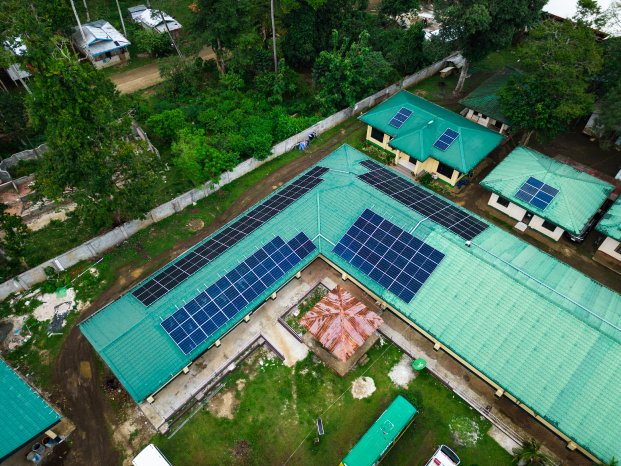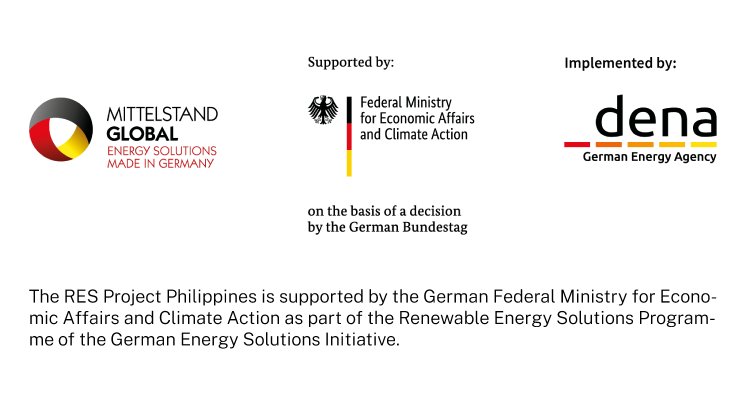The installed solar island system is self-sufficient, featuring a 55.08 kWp photovoltaic (PV) system and lithium-iron-phosphate batteries with a storage capacity of 86.4 kWh. The battery storage accommodates surplus electricity, ensuring power availability even during periods of low solar radiation. The result? A hospital that can operate uninterrupted, providing better patient care with a significantly reduced carbon footprint.
Not only has this solar island system revolutionized operations at Luuk Hospital, but it‘s also an eco-friendly solution, achieving substantial emission savings compared to the previously used diesel generator. The implemented system at Luuk Hospital has had 100% uptime since its installation on the 12th of August until September. At a local utility rate of P12/kWh this resulted in cost savings of PHP 16.500 hence 297.55 USD. Until the 2nd September 2022 alone, 550 litres of diesel were saved, highlighting the system‘s sustainability and cost-effectiveness.
Pre-Assembly for Efficient Installation
The system components such as inverters, charge controllers, and fuses were prewired and tested in BOS’ production facilities in Germany. This careful preassembly is crucial in rural areas like Sulu where there may be limited local infrastructure and technical expertise to handle complex installations. By ensuring the system is functional before arrival and simplifying the installation process, BOS minimizes disruption to the hospital‘s operations, maximizes system reliability and was thereby able to execute installation for eight healthcare facilities in the Philippines within 1,5 months. The system is designed to provide backup during bad weather, with the existing diesel generator integrated as a failsafe in case of PV system failure.
A broader electrification project
This installation at Luuk Hospital is part of a broader electrification project that BOS is undertaking across the Philippines. The company has equipped seven other healthcare facilities with similar systems, including Parang Hospital, Indanan RHU, Tandubas RHU, Tabawan RHU, Caluang RHU, Tuburan RHU, and Al-Barka RHU. These installations collectively account for a total of 435 kWh of lithium capacity and 220 kWp of photovoltaic modules.
Enhancing Healthcare accessability and affordability
The electrification of Luuk Hospital has resulted in significant improvements in the accessibility and affordability of healthcare for local communities. There has been an increased level of healthcare services across all sites, with some facilities reporting up to a fivefold increase in the number of patients cared for daily. Moreover, the hospital can extend its operating hours, providing more healthcare accessibility to the local communities. Patient fees have also been reduced as the removal of diesel expense subsidies that were previously required became possible. Additionally, the need for patients to travel outside their communities for healthcare services has been significantly reduced, further reinforcing the positive impact of this project.
The RES Project Philippines is supported by the German Federal Ministry for Economic Affairs and Climate Action as part of the Renewable Energy Solutions Programme of the German Energy Solutions Initiative.
German Energy Agency (dena)
The German Energy Agency (dena) is a centre of excellence for the applied energy transition and climate protection. dena studies the challenges of building a climate- neutral society and supports the German government in achieving its energy and climate policy objectives. Since its foundation in 2000, dena has worked to develop and implement solutions and bring together national and international partners from politics, industry, the scientific community and all parts of society. dena is a project enterprise and a public company owned by the German federal government. dena’s shareholders are the Federal Republic of Germany and the KfW Group.
www.dena.de/en
German Energy Solutions Initiative
With the aim of positioning German technologies and know-how worldwide, the German Energy Solutions Initiative of the Federal Ministry of Economics and Climate Action (BMWK) supports suppliers of climate-friendly energy solutions in opening up foreign markets. The focus lies on renewable energies, energy efficiency, smart grids and storage, as well as technologies such as power-to-gas and fuel cells. Aimed in particular at small and medium-sized enterprises, the German Energy Solutions Initiative supports participants through measures to prepare market entry as well as to prospect, develop and secure new markets.
www.german-energy-solutions.de/...
Renewable Energy Solutions Programme (RES Programme)
With the RES programme, the Energy Export Initiative of the Federal Ministry of Economics and Climate Action (BMWK) helps German companies in the renewable energy and energy efficiency sectors enter new markets. Within the framework of the programme, reference plants are installed and marketed with the support of the German Energy Agency (dena). Information and training activities help ensure a sustainable market entry and demonstrate the quality of climate-friendly technologies made in Germany.
https://www.german-energy-solutions.de/... dena-res.html



